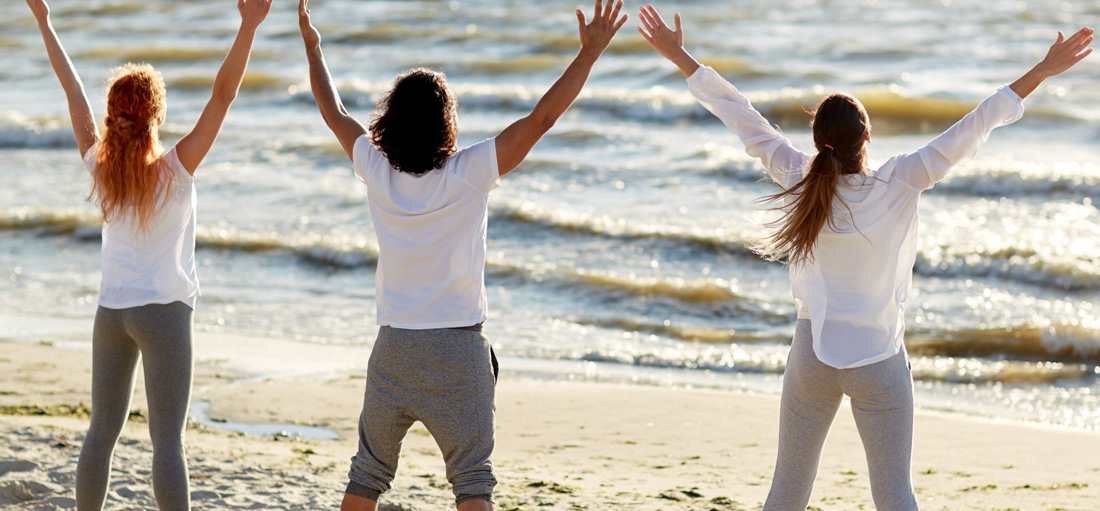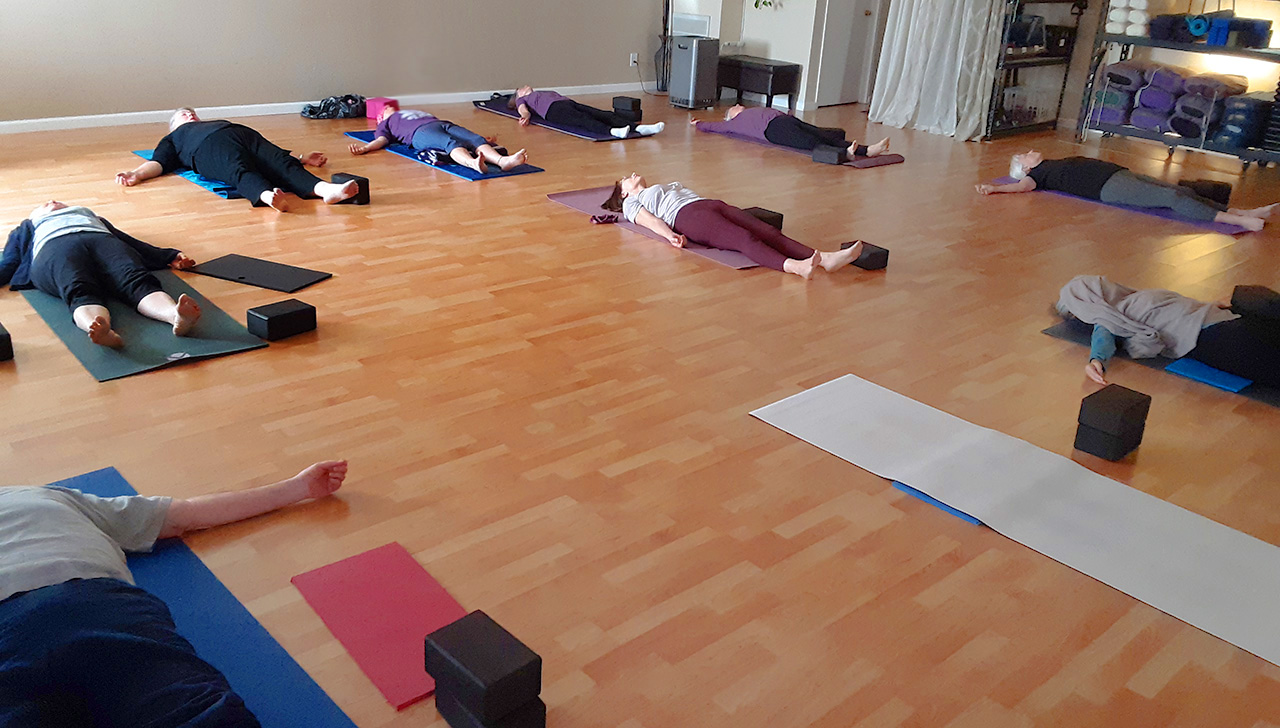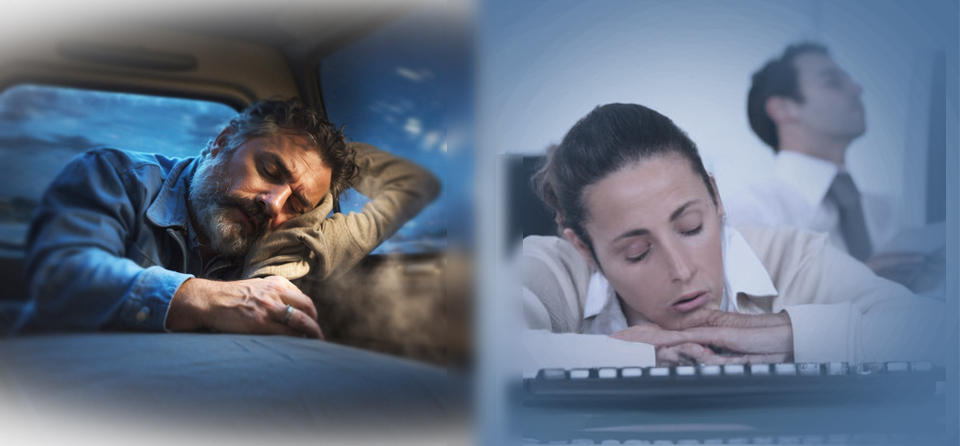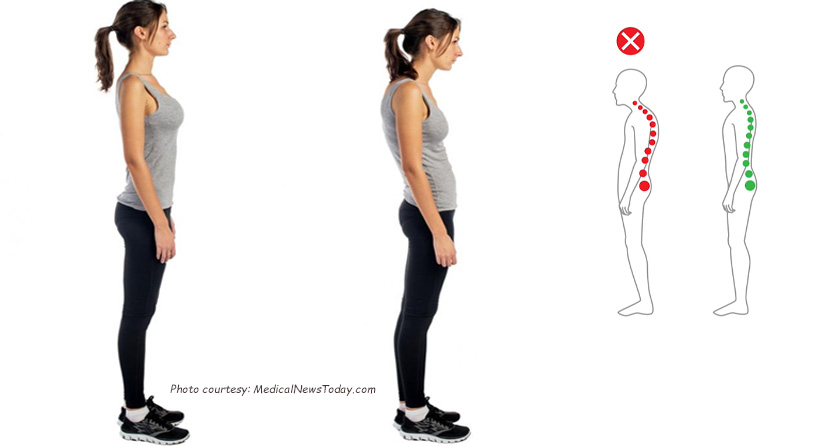Whether a Corporate VP or a stay-at-home parent, use this constructive advice to pull you out of depression from this writer’s own experience
by Gwenn Jones, CPT
May 26, 2022; updated June 30, 2023
Group fitness has flipped far and away from the old 80s coddle to young skinnies in shiny tights. (Thank you.) Still thriving, today’s diversity in group exercise and empathetic coaching intelligently transform the physical and emotional well-being of today’s women.
Four decades of this unbroken love affair have evolved into assorted styles that attract all ages. What has not changed is that group fitness still turns exercise into some badass fun. The laughter is infectious. The airspace is non-punishing. And, without a doubt, if you love it, you do it.
Part of this exercise amazingness caters to those who don’t want to “plan” or think seriously about anything for an hour. Except to frolic and relish our bodies. Group fitness produces inspiring mental and physical discoveries. One is the dramatic enrichment of our mood — instrumental for many women (and men) who suffer from clinical depression.
Our motivation to move forward here is the tallest hurdle. Let’s dive in.
The first sensible step is to nail down our elective motivators
LACK OF MOTIVATION is a recurrent and overwhelming symptom of depression. This is my land mine — and it’s life-effecting. We all need some degree of motivation to initiate anything whether heading to the grocery store or our job. Now, these two are survival motivators. Meaning, we have to eat and we have to pay the rent to survive. We’re on mental auto-pay here as the actual habit is the motivator here. So let’s pluck the survival-ers for now.
Other motivators that hiss at us are the elective motivators or our self-duties. These are bathing, laundry, teeth brushing, exercising, opening mail, etc. These electives take a face slap to perform for depressive brains. When accomplished, our consistency can be spotty.
Exercise is an elective motivator
To activate our exercise motivator we need to summon our mindset to become accountable. This accountability becomes our motivation. Easily said, but unnerving for some.
During depressive episodes, we experience a mental wrestling match to compel accountability. Its success depends on the sense of importance introduced in the fight. Each elective motivator needs profound focus without a roaming mind. Again, easily said. Once conquered your first step forward clocks in.
Question: What’s the toughest part of going to your first group class, or any class?
Answer: Leaving the house, right? (It was for me.)
Q: How can you motivate?
A: Put your workout wear on — that’s a huge push. You’re accountable now.
Cook group exercise and social contact in the same pot
Whatever your exercise choice is, the benefits of a group fitness climate ease depression and anxiety immensely. Both exercise and social contact are pivotal in the prevention and treatment of many mental health disorders. Socialization provides us with comfort, compassion, and empathy.
As the pot simmers…
- The instructors are inspiring, dynamic, and sensitive
- The high-powered music rocks (when class appropriate)
- The camaraderie is comforting
- Occasional grunting? Hysterical
- The negative news is non-existent, you’re way too focused
- Uplifting social connections come to light
- The self-challenge becomes appealing
- Negative stored energy is released; anxiety reduced
- Every class is a celebration
As a rule, we generally seek exercise to better our lifestyle, trim fat, improve sleep, and feel and look better. But to a greater extent, those who exercise and adhere to it value what they’ve become. Read that one twice. Enter, self-confidence.
More motivator food for thought
Once you’re through the door, the mental work is your instructor’s duty, not yours
Group exercise is a serious motivator in itself
Why? You compound your new motivator with adherence. Because:
- those around us know when we show up, and when we don’t — accountability
- those who workout in a group report better consistency — remember that word adhere
- others in the group see your progress, and you see theirs — glorious
- higher success is reported from group exercise — success is what we want, right?
These are pretty brawny motivating factors. Pun intended.
DEPRESSION IS SELF-ISOLATING. This isolation digs us into a deeper hole one day after the next. Commit and climb out of the hole by trying these suggestions. Expect some days to be better than others. Group workouts are a rich way to reach out to others, and they to you in a natural way. If you are the quiet type – fine. No discussion required. Just move your bod and enjoy the action.
Given the positive effects of exercising in a group, it seems simple enough to suggest signing up for a fitness class to anyone who can benefit from a shift in mood. But the ability to engage with a group can be a hurdle for individuals suffering from depression. The same goes for starting an exercise routine. Lack of motivation is common among people with a mood disorder. Given these challenges, setting modest exercise goals with as little as one extra person working out alongside is the perfect starting point. As confidence in the ability to exercise and interact with others grows, workout frequency and the number of fellow exercisers can gradually increase, which should result in less sadness, anxiety and overall depression.
See article by Jill Barker • Special to Montreal Gazette Publishing date: Sep 12, 2021, https://montrealgazette.com/health/diet-fitness/fitness-having-a-workout-buddy-might-help-improve-your-mood
Group Exercise doesn’t have to be grueling to ease depression
Group workouts have magnificent and powerful effects on mental health challenges. Stress levels remarkably reduce as our spirits climb to unrivaled honey. And all physical activity is mood-enhancing. Whether a fanatic or subdued fitness participant, any form of exercise improves our outlook and energy. The proven scientific results are a better quality of life.
Exercisers experience higher all-day energy, reduced stress, sharper memory power, boosted self-confidence, improved sleep, positive attitude, better bones, and a fitter physique.
When past solo attempts to better your mental health have been unsuccessful, I urge you to try a form of group exercise. You will make progress; you will transform.
Here are some unbeatable lures to chew on:
- You’re never alone
- Solid emotional support awaits (aka security blanket)
- Exercise time passes quickly
- The community connection is immediate
- The mix of personalities is witty and educational
- The gains are life-altering
- You are doing something meaningful for yourself and others like you
After your first class you’re all fired up
Here comes euphoria. Where self-confidence and sadness were buried deep in your soul – both now seem a bit lame. You are now self-assured. You are the master of you. Depression is a chasm you’ve climbed out of. One day is not a fix. But the road you are on takes you to outstanding mental medicine.
Welcome to my beginning. This could be YOU.
This part is major in the life-altering mix of social and health benefits. Soon, you will likely seek out more fitness class options (or trainers) that suit you best. In 2021, yoga scored number one in popularity — particularly for mid-age and senior women in the USA. With age, we develop some aches and pains therefore our joints respond better with a low-impact practice.
The blessings of yoga practice are:
- all our muscles are strengthened and stretched
- the joint impact is minimal
- the breath focus engages a simmering self-release
- we accept ourselves with pride
Long-awaited by fitness trainers, contemporary physicians now surrender to, “Try yoga instead of drugs.” Note the word, contemporary.
Each time a newbie comes to my yoga studio referred by their physician, I dance on a cloud in my delirious headspace. Not a mere dance for the new student, but for one more open-minded medical professional who chose science before drugs (when applicable).
More onboarding group fitness winners – somewhat more intense – are Barre, Pilates, Stretching, Spinning, Dance, group walking clubs, and are you ready? Pickleball.
As a trainer, my foremost recommendation is swimming for all-around, low-impact, major-muscles-inclusive fitness. However, pools are less accessible than the pre-mentioned locales.
There is much diversity in our demographic areas to take advantage of. One option is a local recreation center if a fitness center or dedicated studio is unavailable.
Need an alternative?
If a group atmosphere is not possible for you, step outdoors. Being outside in nature lowers tension or anger. Walk around the block. Walk your dog. Every day is a step forward. These actions become our motivators and they stick. No gym required. A neighbor might even join you. Extend an invitation.
Getting back to motivators, here’s a non-fitness motivator example:
Let’s try what I call an organic motivator
Here’s an example. You are out running errands and bump into an acquaintance who says, “Hey, you look great in green.” The compliment settles in sweetly. Later you will pluck that little party favor out of your brain and I bet your next clothing purchase is green. (Maybe yoga clothes?) When you wear it, you’ll hold your head proudly. Voila! A perfect organic motivator. Every time I slip into new fitness wear, I’m pumped for the day.
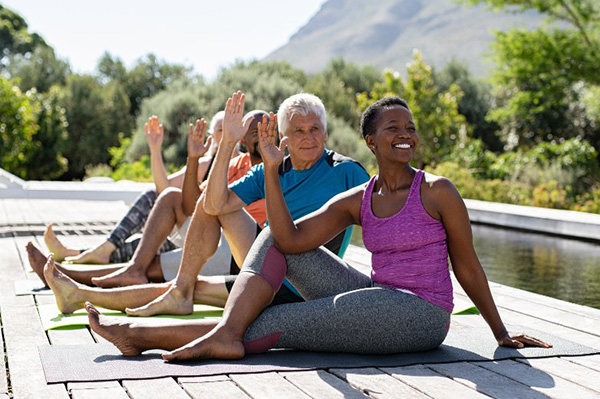
The happy chemicals that hoist us up
Exercise sessions release particular chemicals from our brain and central nervous system. For example, the brisk walk, a yoga practice, a swim, or a bike ride. These natural brain chemicals are called “happy chemicals” or endorphins. Different exercise intensities release varying levels of endorphins. Different activities do as well, such as eating chocolate, laughing, or having sex.
“Endorphins are neurochemicals produced in the body in the pituitary gland in response to stress and pain,” Dr. J. Kip Matthews, sports psychologist explains. In layman’s terms, they’re kind of like natural painkillers. “They interact with opiate receptors in the body, which then minimizes our pain experience.” As in: They make you feel good.
The Takeaway
Society today has begun to respect mental health and its importance to us all. Depression is a force to be reckoned with and needs treatment. Many of us with mild-to-moderate depressive illness who commit to regular exercise require no medications.
Mental illness, no matter the degree, affects youth, adults, and the elderly for various reasons. Mental illness bears no bias against CEOs, food servers, nurses — anyone. It affects our marriages, friendships, jobs, nutrition, and physical well-being.
Every worthwhile wellness organization advocates regular physical exercise to treat depression. Why? Because it works and works long-term with consistency. But, once more, we must harness that accountability challenge.
It might take 3 or 4 tries to develop your mindset and nab your accountability marker. Be patient with yourself. Self-improvement and self-help are the goals. Not self-perfection.
My story: How my first class went
I tried my first group fitness class 30 years ago. The concept was alien to me. And, Lordy, pink shimmer pants were voguish. It’s easy to UNremember that.
THE BASS POUNDED. I was less than masterful but, it was kickass fun. My body partied with 25 other humans punching the air and kicking the invisible heavy bag in sync with some top-20-radio-hit-something. After class (and still standing), I was rather puffy-chested, to be honest. I couldn’t wait ’til next time and didn’t turn back. I was confident, positive, and the freakin’ boss of me. Life felt fresh; my spirit jumped a planet. In short order, I made fitness friends.
After five years I went on to study and became a pro fitness trainer and yoga studio owner. I was intent on consistent physical fitness and helping others achieve the same, in body and mind.
Over to YOU—Your next accountability appointment starts here
And, there WILL be one. To create your next accountability, make yourself an appointment. It’s as simple as a sticky note on the bathroom mirror. I did this for years and still do when a new elective motivator enters my life. The reason is, outside of my engaging job, I still have trouble leaving the house.
Too simple? Not really. The sticky note example removes the complexity of keeping a brain calendar. That calendar is in constant play mode of multiple incoming duties. This invites complexity which, in a depressive mind, builds uninvited pressure. That pressure can be a negative distraction. Certain negatives can blast our depressive behavior backward – in moments. Do you see the trickle here?
So, make your sticky appointment. Find it on the bathroom mirror tomorrow morning, “Pickeball 3 PM,” or “Yoga, bring water.” Breathe big knowing it’s a new day, with new friends, and a positive outlook. Let’s go, gals!
Need assistance? Contact me for a consult.
An Aside, as a Personal Trainer:
Clients who struggle through damaging life events, including mild-to-moderate depression, often reach out to their coach with trust. They share their private stories. They express how exercise programs have freed them of the dark mindset. Through continuing education, certified fitness trainers have studied anxiety and depression more extensively in the past decade.
Each client has different needs somewhat beyond physical exercise. As mentioned, motivation or self-confidence top those needs for many depression sufferers. Therefore, commending our fitness clients on his/her genuine accomplishments lifts them. These declarations resonate deeply as clients battle their constant self-analysis. In turn, the positive shines inward and outward. Deservedly so.
Building palpable relationships with struggling clients takes solid on-the-job experience from a seasoned professional. At rare times an ombudsman role kicks in.
MOREOVER, qualified fitness pros must recognize when a client might benefit from a more precise level of professional help. If the trusting client opens the door, discreetly recommending extra help is our responsibility (where appropriate and without judgment or diagnosis).
We must contribute in all ways possible to better our clients’ physical and mental wellness. —Gwenn

Article by:
Gwenn Jones, CPT, CYT — Content writer in Wellness-Lifestyle-Fitness, Gwenn is a 25-year ACE-certified personal fitness trainer, yoga studio owner, instructor and fitness consultant. Grateful to be a native Californian where happily home-based.
Lawrence Robinson, Jeanne Segal, Ph.D., and Melinda Smith, M.A., “What are the mental health benefits of exercise?” Helpguide.org, https://www.helpguide.org/articles/healthy-living/the-mental-health-benefits-of-exercise.htm, updated November 14, 2022
Beth Daley, “Group exercise may be even better for you than solo workouts – here’s why.” Theconversation.com, December 29, 2020, https://theconversation.com/group-exercise-may-be-even-better-for-you-than-solo-workouts-heres-why-149348
Kelsey Graham, “Exercise to Reduce Symptoms of Anxiety and Depression,” AceFitness.org, August 29, 2017, https://www.acefitness.org/resources/everyone/blog/6537/exercise-to-reduce-symptoms-of-anxiety-and-depression/
Jill Barker, “Fitness: Having a workout buddy might help improve your mood.” Montrealgazette.com, September 12, 2021, https://montrealgazette.com/health/diet-fitness/fitness-having-a-workout-buddy-might-help-improve-your-mood
Maria Cohut, Ph.D., fact checked by Jasmin Collier, Medical News Today: “What are the health benefits of being social?” Medicalnewstoday.com, February 23, 2018, https://www.medicalnewstoday.com/articles/321019#Social-context-determines-healthful-habits
Kelly McGonigal, “Five Surprising Ways Exercise Changes Your Brain.” Greatergood.berkeley.edu, January 6, 2020, https://greatergood.berkeley.edu/article/itetm/five_surprising_ways_exercise_changes_your_brain
Emily Laurence, “Endorphins and Exercise: How Intense Does a Workout Have to Be for the ‘High’ to Kick in?” Wellandgood.com, July 27, 2018, https://www.wellandgood.com/endorphins-and-exercise/

